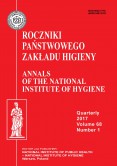Rocz Panstw Zakl Hig 2016, 67(4): 391-397
Estimation of dietary supplements intake in a selected group of women over 50 and the risk assessment of interactions between the ingredients of dietary supplements and drugs.
[Estimation of dietary supplements intake in a selected group of women over 50 and the risk assessment of interactions between the ingredients of dietary supplements and drugs.]
ABSTRACT
Background. Concurrent use of dietary supplements and drugs may result in complications of pharmacotherapy due to possible interactions between their ingredients.
Objectives. The aim of the survey was to estimate the intake of dietary supplements in a group of women over 50 and to analyse the risk of interactions between the ingredients of dietary supplements and drugs taken by the women.
Material and Methods. The study was carried out among 146 women over 50 years of age. Questionnaire included detailed questions on the type of prescription drugs, OTC (over-the-counter) drugs, and dietary supplements taken. The risk of interactions was determined on the basis of chemical composition of the drugs and supplements specified by the manufacturer, by comparing the obtained data with literature reports on known interactions.
Results. The analysis has shown that 88.4% of respondents constantly took prescription drugs, 44.5% of them took OTC drugs, and 66.4% of respondents took dietary supplements throughout the survey period. It has been found that 71.3% of surveyed women taking prescription drugs, took dietary supplements as well. Among women taking supplements and drugs, 36.9% of respondents were taking them concurrently, 60.9% kept such an interval, but only 21.8% of them waited for at least two hours. It has been found that the drug-supplement interactions might occur in 35.8% women under the survey.
Conclusions. The analysis of the obtained results has revealed that taking dietary supplements by the group under survey was frequent, and the risk of interactions between dietary supplements and drugs was significant. It is recommended that doctors ask their patients about taken supplements during regular check-ups, and inform them about possible interactions between dietary supplements and drugs. Moreover, appropriate would be to change the labelling of dietary supplements, so that the packaging provides information on possible interactions between their ingredients and drugs.
STRESZCZENIE
Wprowadzenie. Jednoczesne spożywanie suplementów diety i leków może być przyczyną powikłań farmakoterapii, ze względu na możliwość wystąpienia interakcji pomiędzy ich składnikami.
Cel. Celem przeprowadzonych badań była ocena spożycia suplementów diety w wybranej grupie kobiet po 50 roku życia oraz analiza ryzyka wystąpienia interakcji pomiędzy składnikami suplementów diety a przyjmowanymi przez te kobiety lekami.
Materiał i metody. Badania przeprowadzono wśród 146 kobiet po 50 roku życia. W ankietach zawarto szczegółowe pytania dotyczące rodzaju zażywanych leków przepisanych przez lekarza, przyjmowanych leków bez recepty oraz spożywanych suplementów diety. Ryzyko wystąpienia interakcji określono na podstawie składu stosowanych przez badane leków oraz suplementów, odnosząc uzyskane dane do informacji o interakcjach podanych w literaturze.
Wyniki. Analizując uzyskane wyniki stwierdzono, że 88,4% badanych przyjmowało na stałe leki przepisane przez lekarza 44,5% stosowało leki bez recepty, a 66,4% badanych w okresie badania zażywało suplementy diety. Stwierdzono, że 71,3% badanych kobiet, przyjmujących leki przepisane przez lekarza, stosowało także suplementy diety. Spośród kobiet stosujących suplementy i leki 36,9% przyjmowało je w jednym czasie, przerwę stosowało 60,9% badanych, jednak tylko u 21,8% badanych była ona co najmniej 2 godzinna. Stwierdzono, że interakcja lek - suplement mogła zachodzić u 35,8% badanych kobiet.
Wnioski. Analizując uzyskane wyniki stwierdzono, że przyjmowanie suplementów diety w badanej grupie osób było częste, a ryzyko wystąpienia interakcji pomiędzy przyjmowanymi suplementami diety a lekami było znaczne. Wskazane byłoby wprowadzenie rutynowych pytań podczas wizyty lekarskiej o stosowaniu suplementacji i informowanie pacjenta o możliwości interakcji pomiędzy składnikami suplementów diety a lekami. Celowa wydaje się także zmiana oznakowania na opakowaniach suplementów diety, uwzględniająca informacje o możliwości zajścia interakcji pomiędzy składnikami suplementów i przyjmowanymi lekami.
Downloads: 2128


